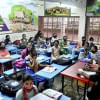Can parents keep up with the high cost of education?

There seems to be no end to the sufferings of the people of limited income who have been, for several months now, struggling to cope with the insanely high prices of daily essentials and amenities including utilities, transport and healthcare. According to a report by this daily, the prices of stationery items and study materials have also hit them hard now, increasing the cost of education. People are being forced to pay 15-25 percent more for school supplies such as notebooks, exercise books, pens, pencils, calculators and geometry boxes, etc. than what they used to pay two months ago. While a 500-page pack of paper would cost Tk 280 in July, it now costs Tk 380. Even the price of a small-size notebook reportedly doubled to Tk 20 – from Tk 10 – in just two months. Alongside these, the tuition and coaching fees of children have also increased significantly.
As per the latest Unesco Global Education Monitoring Report, almost two-thirds of the total cost of education in Bangladesh are covered by households. This points to the weakness of our education system where the state fails to bear a major share of the educational expenses of its population, as it should.
While the authorities should investigate what is causing this hike in the prices of school supplies – whether there is any actual reason behind this, or this is just the act of unscrupulous syndicates exploiting the ongoing inflation – our policymakers also need to look into the factors playing a role in increasing the overall educational expenses of children. The latest Unesco Global Education Monitoring Report has found that almost two-thirds of the total cost of education in Bangladesh are covered by households. This definitely points to the weakness of our education system where the state fails to bear the major share of the educational expenses of its population, as it should.
We also do not understand why the guardians of students would have to pay such an insane amount of money to private tutors and coaching centres. Some parents, while talking to our reporters, have said that a private tutor now charges between Tk 2,500 and Tk 7,000 for teaching students of different classes although, ideally, school education should be enough for them. We must ask then: how will the people of fixed income bear such high expenses? Why are our schools failing to provide complete education to our children? In this regard, what is most disturbing is that despite all the talk about stopping the coaching trade and private tuitions in the country, nothing substantive has been done so far by the government.
Coming back to the issue of the cost increase of regular stationery and study materials, we think the government must take some immediate measures to check any unreasonable increase in the prices of these vital learning tools and ensure these are within the reach of all households. It must also develop a market monitoring mechanism to check any illegal practices. If the government cannot take effective measures to reduce the educational expenses of children, we may soon see an increase in school dropouts, child labour and child marriages in the country.

 For all latest news, follow The Daily Star's Google News channel.
For all latest news, follow The Daily Star's Google News channel. 







Comments